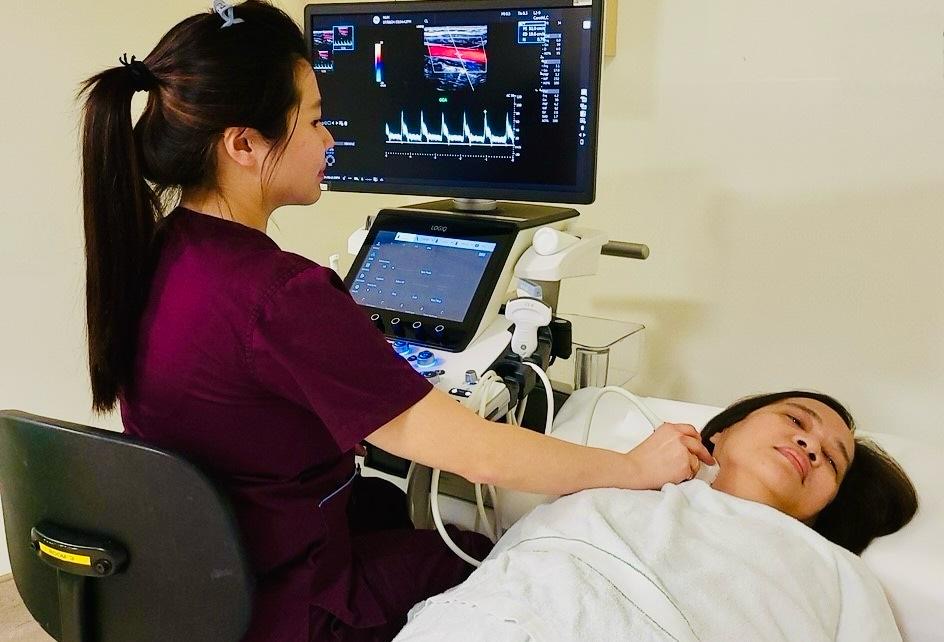
A vascular scan being performed at the National University Heart Centre, Singapore (NUHCS). (Photo credit: NUHCS)
Singapore — Cardiovascular disease is the number one cause of death in Singapore, accounting for 31 per cent of deaths in 2022. Timely and precise diagnosis is crucial to ensure that patients receive prompt and effective treatment for their condition. Diagnostic vascular laboratories within hospitals, outpatient centres and physicians’ offices play an important role in early detection through vascular testing procedures.
Since July this year, the National University Heart Centre, Singapore’s (NUHCS) Diagnostic Vascular Laboratory (DVL) has become the first and only laboratory in Asia to earn the acclaimed Intersocietal Accreditation Commission (IAC) accreditation. This accolade recognises institutes for the quality of diagnostic services and patient care provided.
NUHCS’s DVL has been accredited by the IAC for peripheral arterial testing, extracranial cerebrovascular testing and peripheral venous testing. These tests are vital for detecting common vascular issues such as deep vein thrombosis, peripheral arterial disease, cerebrovascular disease and abdominal aortic aneurysm.
Vast applications of vascular testing
NUHCS’s DVL scans over 7,000 cases a year, which help doctors make important clinical decisions across various fields beyond vascular surgery, including emergency medicine, internal medicine, orthopaedics, cardiothoracic surgery and paediatrics. The lab’s diagnostic capabilities extend to patients as young as a few days old.
DVL scans are pivotal in optimising interventions for common vascular issues. For instance, the lab scans can help establish blood flow anatomy in patients with foot gangrene or ulcers, enabling vascular surgeons to plan amputations with higher success rates of wound healing. For gangrene patients with renal dysfunction, DVL scans can provide an alternative to CT scans, which can affect their kidney function.
Patients with deep vein thrombosis also benefit significantly from DVL scans, which can help identify the location and extent of clots, assess the condition of neighbouring vessels, and serve as a roadmap for treatment plans, leading to better clinical outcomes.
Ensuring diagnostic accuracy and quality care
The IAC accreditation is awarded after a rigorous evaluation process that assessed the expertise in imaging and intervention-based procedures. All medical technologists in the NUHCS DVL are also awarded the Registered Vascular Technologist (RVT) certification by the American Registry for Diagnostic Medical Sonography (ARDMS).
Dr Peter Chang, Director of the NUHCS DVL and Senior Consultant in the Department of Cardiology and Department of Cardiac, Thoracic and Vascular Surgery (CTVS) at NUHCS, said, “The certifications of our technologists and the IAC accreditation distinguishes our team as experts in vascular ultrasound scanning and vascular ultrasound interpretation. This assurance of quality enables our patients and referring physicians to trust the scans we provide and the subsequent medical decisions based on them.”
Dr Chang has also been awarded the Registered Physician in Vascular Interpretation (RPVI) certification.
Adjunct Associate Professor Rajesh Dharmaraj, Head of Division and Senior Consultant, Division of Vascular Surgery, Department of CTVS, NUHCS, said, “As the only centre in Asia to hold this accreditation, we continue to set the benchmark for vascular diagnostic excellence, on par with the best laboratories internationally. This achievement underscores our ongoing commitment to innovation in vascular imaging and our mission to enhance patient care.”
To download the PDF version of the media release, click here.


















